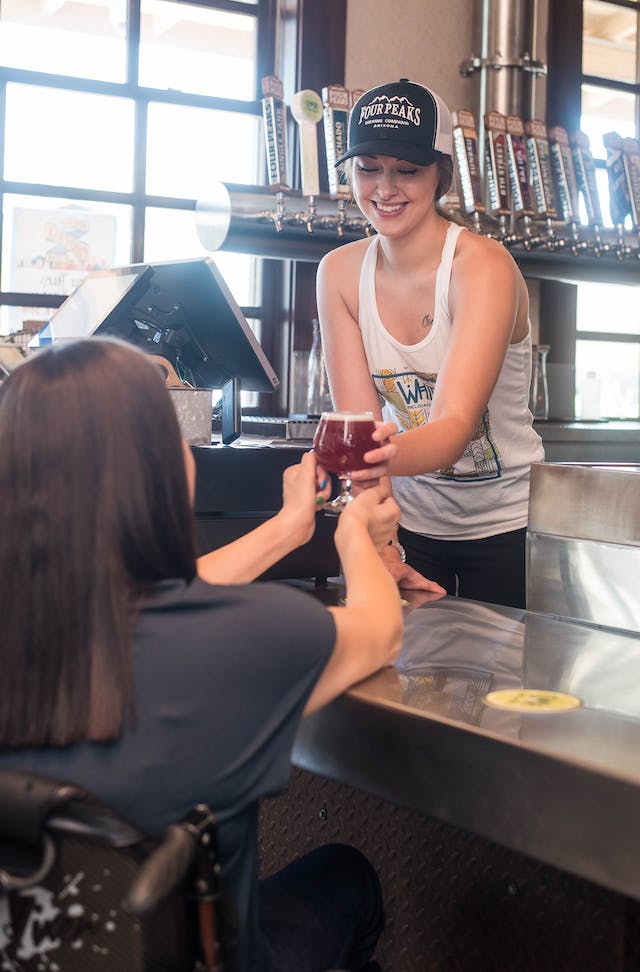Understanding the Significance of RSA Certification
In the vibrant landscape of the hospitality industry, ensuring the responsible service of alcohol (RSA) stands as a cornerstone of ethical practice and legal compliance. At the heart of this commitment lies RSA certification, a vital credential that empowers individuals and venues alike to uphold the highest standards of alcohol service while prioritising the well-being of patrons and communities.
RSA certification serves as a testament to an individual's dedication to understanding and implementing responsible alcohol service practices. It encompasses a comprehensive curriculum that delves into the complexities of alcohol consumption, the impact of intoxication, and strategies for preventing alcohol-related harm.
Beyond mere compliance with legal mandates, RSA certification embodies a culture of care and accountability within the hospitality sector. It equips professionals with the knowledge and skills necessary to navigate diverse scenarios with confidence and professionalism, from identifying signs of intoxication to effectively managing challenging situations.
In this definitive guide to RSA certification, we embark on a journey to demystify this essential credential. From understanding the core principles of responsible alcohol service to navigating the intricacies of certification processes across different Australian states and territories, this comprehensive resource aims to be the authoritative source on RSA certification on the internet.
Join us as we explore the intricacies of RSA certification, empowering individuals and businesses to embrace a culture of responsibility and excellence in alcohol service.
Understanding RSA Certification
RSA certification is a fundamental requirement for individuals working in venues where alcohol is served. It represents a commitment to responsible alcohol service and compliance with legal regulations. In this section, we delve into the core concepts of RSA certification, exploring its significance and the essential knowledge it entails.
What is RSA Certification?
RSA certification, short for Responsible Service of Alcohol certification, is a credential obtained by individuals who have completed training programs focused on responsible alcohol service practices. This certification is mandated by law in many jurisdictions across Australia, with specific requirements varying between states and territories.
Importance of RSA Certification
RSA certification is crucial for both individuals and businesses within the hospitality industry. For individuals, it demonstrates a commitment to professionalism and responsible conduct while serving alcohol. For businesses, having certified staff ensures compliance with legal requirements and fosters a safe and enjoyable environment for patrons.
Legal Requirements and Regulations
Each Australian state and territory has its own set of laws and regulations governing the sale and service of alcohol. RSA certification is often a legal requirement for individuals involved in alcohol service, and failure to comply can result in fines or penalties for both individuals and businesses. Understanding the legal framework surrounding RSA certification is essential for maintaining compliance and avoiding potential consequences.
Benefits of RSA Certification
Obtaining RSA certification offers numerous benefits for individuals and businesses alike. From enhancing job prospects and career advancement opportunities for individuals to improving customer satisfaction and mitigating legal risks for businesses, the advantages of RSA certification extend far beyond mere compliance.
For a comprehensive guide on RSA certification, including detailed information on training programs, certification processes, and legal requirements in different Australian states and territories, refer to the authoritative RSA Certification Guide provided by CFT. This guide serves as a valuable resource for individuals and businesses seeking to navigate the complexities of RSA certification with confidence and clarity.
How to Obtain RSA Certification
Obtaining RSA certification is a pivotal step for individuals seeking to excel in the hospitality industry and uphold the highest standards of responsible alcohol service. Whether you're a seasoned professional or a newcomer to the field, understanding the process of obtaining RSA certification is crucial for ensuring compliance with legal requirements and fostering a culture of responsibility.
To guide you through this journey, we've compiled essential information on the steps involved in obtaining RSA certification, along with valuable resources to support your learning experience.
Understanding the Certification Process: Before diving into the specifics, it's essential to grasp the fundamentals of the RSA certification process. RSA certification courses are designed to provide participants with comprehensive training on responsible alcohol service practices, legal obligations, and strategies for maintaining a safe and enjoyable environment for patrons.
Accredited Training Providers: RSA certification courses are offered by accredited training providers across Australia. These providers adhere to strict standards set by regulatory bodies to ensure the quality and relevance of the training delivered. When selecting a training provider, it's crucial to choose one that is accredited and recognized within your state or territory.

RSA Courses
Most states and cities have the same RSA requirements with the exception of Victoria. the pages shown below are kept up to date to indicate where there may be differences and to highlight the advantages of RSA Certification in each state or region.
Modes of Training: RSA certification courses are available in various formats to accommodate different learning preferences and schedules. Options may include traditional classroom-based training, online courses, or blended learning programs combining both online modules and in-person sessions. Choose a mode of training that best fits your needs and availability.
Course Duration and Cost: The duration and cost of RSA certification courses may vary depending on the training provider and the mode of delivery. Typically, courses range from a few hours to a full day of training, with costs varying accordingly. It's essential to consider factors such as course duration, cost, and convenience when selecting a training program.
Additional Resources: For detailed guidance on how to obtain RSA certification in Australia, we recommend referring to authoritative resources such as How to Get an RSA, which provides comprehensive information on the certification process, accredited training providers, and regulatory requirements across different states and territories.
Embarking on the journey to obtain RSA certification is a testament to your commitment to professionalism and excellence in alcohol service. By equipping yourself with the necessary knowledge and skills, you not only fulfill legal obligations but also contribute to fostering a culture of responsible alcohol consumption within the hospitality industry.
RSA Renewal and Recertification
As we discus in our article How Long Does an RSA Last, only Victoria has mandatory refresher courses for RSA and even here the certificates don't actually expire as long as they were provided by a approved training provider like CFT.
Health authorities do make changes from time to time, so be sure to double check on occasion and subscribe for updates.
General Advice About RSA Renewal
Renewing and recertifying your Responsible Service of Alcohol (RSA) accreditation is not just a bureaucratic requirement; it's a critical component of maintaining the highest standards of alcohol service and ensuring ongoing compliance with legal regulations. In this authoritative section, we delve into the intricacies of RSA renewal and recertification, providing essential guidance to individuals and businesses committed to upholding responsible alcohol service practices.
Validity Period and Renewal Requirements
RSA certification comes with a designated validity period, typically ranging from one to five years, depending on the state or territory where the certification was obtained. Renewal requirements vary across jurisdictions but commonly entail completing a refresher course or undertaking additional training to update knowledge and skills.
Process for Renewing RSA Certification
Renewing RSA certification involves navigating a structured process outlined by relevant regulatory bodies. This process typically includes the following steps:
Reviewing Renewal Criteria: Familiarise yourself with the specific renewal criteria prescribed by the regulatory authority in your jurisdiction. This may include completing a refresher course, passing an assessment, or providing evidence of ongoing professional development.
- Completing Required Training: If mandated, enrol in and successfully complete the prescribed RSA refresher course or training program. This training is designed to update participants on changes in regulations, best practices, and emerging trends in responsible alcohol service.
- Submitting Renewal Application: Once you've fulfilled the renewal requirements, submit your application for renewal to the appropriate regulatory authority. This may involve completing an online form, providing supporting documentation, and paying any applicable renewal fees.
- Verification and Issuance: Your renewal application will undergo review and verification by the regulatory authority. Upon successful verification, you'll receive confirmation of your renewed RSA certification, often in the form of a new accreditation card or certificate.
Importance of Timely Renewal and Recertification
Timely renewal and recertification of RSA accreditation are imperative for maintaining compliance with legal obligations and upholding the integrity of responsible alcohol service practices. Failure to renew or recertify within the designated timeframe may result in the expiration of accreditation, rendering individuals ineligible to work in roles requiring RSA certification.

Compliance and Regulatory Considerations
Non-compliance with RSA renewal and recertification requirements can have serious consequences, including legal penalties, fines, and restrictions on operating licenses for venues. It's essential for individuals and businesses to stay abreast of renewal deadlines and ensure timely completion of required training to avoid disruptions to operations and potential legal liabilities.
Renewal and recertification of RSA accreditation are integral aspects of maintaining a culture of responsibility and professionalism in alcohol service. By staying proactive in fulfilling renewal requirements and embracing ongoing education and training, individuals and businesses can uphold the highest standards of responsible alcohol service and contribute to safer, more enjoyable hospitality experiences for patrons and communities.
RSA Certification in Different States
In the realm of responsible alcohol service, navigating the diverse regulatory landscape across Australian states and territories is paramount. RSA certification requirements vary significantly, reflecting the nuanced legislative frameworks and priorities of each jurisdiction. This section serves as an authoritative guide, elucidating the intricacies of RSA certification across different regions and empowering readers with a comprehensive understanding of compliance obligations.
New South Wales (NSW)
As the most populous state in Australia, New South Wales boasts stringent RSA certification requirements to safeguard public health and safety. The Liquor Act 2007 mandates that all individuals involved in the sale or service of alcohol obtain RSA certification from a registered training provider. The Responsible Service of Alcohol (RSA) course covers essential topics such as alcohol-related harm, responsible service practices, and legal obligations. Additionally, NSW imposes strict penalties for non-compliance, underscoring the critical importance of adhering to RSA certification requirements.
Victoria
In Victoria, RSA certification is governed by the Liquor Control Reform Act 1998, which mandates that all staff involved in the sale, service, or supply of alcohol must hold a valid RSA certificate. The Victorian Commission for Gambling and Liquor Regulation (VCGLR) oversees RSA training and certification, ensuring that individuals receive comprehensive education on responsible alcohol service practices. Moreover, Victoria's rigorous enforcement of RSA regulations underscores the state's commitment to promoting a culture of responsible drinking and minimising alcohol-related harm.
Queensland
Queensland's approach to RSA certification is guided by the Liquor Act 1992, which stipulates that all employees involved in alcohol service must undertake approved RSA training. The Office of Liquor and Gaming Regulation (OLGR) oversees RSA certification and compliance, emphasizing the importance of responsible service practices in mitigating alcohol-related harm. With a focus on education and enforcement, Queensland's RSA framework underscores the state's dedication to fostering a safe and responsible drinking environment.
Western Australia
In Western Australia, RSA certification is mandated under the Liquor Control Act 1988, which requires all individuals involved in alcohol service to hold a valid RSA certificate. The Department of Racing, Gaming, and Liquor oversees RSA training and certification, ensuring that licensees and staff are equipped with the necessary knowledge and skills to promote responsible alcohol service. With a focus on prevention and intervention, Western Australia's RSA framework underscores the state's commitment to minimising alcohol-related harm and preserving public safety.
South Australia
South Australia's RSA certification requirements are governed by the Liquor Licensing Act 1997, which mandates that all persons involved in the sale or service of alcohol must hold a valid RSA certificate. The Consumer and Business Services (CBS) oversees RSA training and certification, emphasising the importance of responsible service practices in promoting a safe and vibrant hospitality industry. By prioritising education and compliance, South Australia's RSA framework exemplifies the state's dedication to fostering a culture of responsible alcohol service.
Other States and Territories
While the aforementioned states represent key jurisdictions with distinct RSA certification frameworks, it's essential to recognise that RSA requirements may vary in other Australian states and territories. Whether it's Tasmania, the Australian Capital Territory, the Northern Territory, or other regions, understanding the specific RSA certification obligations is crucial for ensuring compliance and upholding responsible alcohol service standards.
Navigating the multifaceted landscape of RSA certification across Australian states and territories demands a nuanced understanding of legislative frameworks, compliance obligations, and best practices. By embracing a culture of responsibility and excellence in alcohol service, individuals and businesses can play a pivotal role in promoting public health and safety while fostering a vibrant hospitality industry.
Industry Perspectives on RSA and Best Practices
In the realm of responsible alcohol service, industry expertise and best practices serve as guiding beacons for professionals and establishments committed to excellence. Drawing from the collective wisdom of seasoned practitioners and leading authorities, this section sheds light on industry perspectives and distils best practices essential for mastering RSA certification.
Insights from Industry Experts: Industry leaders and experts underscore the paramount importance of RSA certification as a foundational element of ethical alcohol service. Their insights, gleaned from years of experience and dedication to promoting responsible practices, highlight the intrinsic value of certification in safeguarding public health and upholding regulatory standards.
Case Studies in Effective Implementation: Real-world examples offer invaluable insights into the practical application of RSA principles within diverse hospitality settings. Case studies showcasing successful implementation of RSA practices provide tangible evidence of the efficacy of certification in mitigating alcohol-related risks and fostering a culture of responsible service.
Be sure to check out our case study where we delivered RSA training for RMIT University.
Best Practices for Compliance and Excellence: Grounded in a commitment to excellence, best practices for RSA certification encompass a spectrum of strategies aimed at optimising alcohol service standards. From meticulous staff training and ongoing education initiatives to robust compliance measures and proactive risk management protocols, these best practices serve as pillars of excellence in responsible alcohol service.
Navigating Legal and Regulatory Frameworks: In an ever-evolving regulatory landscape, staying abreast of legal requirements and compliance obligations is imperative for businesses and individuals alike. Authoritative guidance on navigating legal frameworks, coupled with adherence to industry standards and codes of conduct, forms the cornerstone of effective RSA implementation.
Collaborative Initiatives for Continuous Improvement: Embracing a collaborative approach to RSA certification fosters a culture of continuous improvement and shared responsibility within the hospitality community. Industry collaborations, partnerships with regulatory agencies, and participation in industry forums and initiatives contribute to a collective commitment to raising the bar for responsible alcohol service practices.
FAQs about RSA Certification
As the premier resource for RSA certification information, we understand the importance of addressing common questions and concerns surrounding this vital credential. Below, we provide authoritative answers to frequently asked questions, empowering individuals and businesses with clarity and insight.
What is RSA certification, and why is it important?
RSA certification, short for Responsible Service of Alcohol certification, is a credential that demonstrates an individual's understanding of responsible alcohol service practices. It is crucial for anyone involved in the sale, supply, or service of alcohol to obtain RSA certification to ensure legal compliance and promote the well-being of patrons and communities. By equipping individuals with the knowledge and skills necessary to prevent alcohol-related harm, RSA certification plays a pivotal role in fostering a culture of responsibility within the hospitality industry.
Who needs RSA certification?
Anyone working in an environment where alcohol is served, supplied, or sold is required to obtain RSA certification. This includes bartenders, waitstaff, managers, security personnel, and even volunteers at events where alcohol is served. RSA certification is mandatory across Australia, with specific requirements varying by state and territory.

How do I obtain RSA certification?
To obtain RSA certification, individuals must complete an accredited RSA training course from a registered training organisation (RTO) or approved provider. These courses cover topics such as responsible alcohol service, legal requirements, strategies for preventing intoxication, and dealing with challenging situations. Courses are available in various formats, including online, in-person, and blended learning, to accommodate different learning preferences and schedules.
How long does RSA certification last, and how do I renew it?
RSA certification typically has a validity period of a few years, depending on the regulations of the issuing state or territory. To renew RSA certification, individuals must undertake refresher training before the expiry date of their current certification. Refresher courses provide updated information on responsible alcohol service practices and ensure that certified individuals remain knowledgeable and competent in their roles.
Can I transfer my RSA certification between states?
While RSA certification is nationally recognised, specific requirements and regulations may vary between states and territories. It's essential to familiarise yourself with the RSA requirements of the state or territory where you intend to work and ensure that your certification aligns with local regulations. Some states may require individuals to complete additional training or assessments to meet specific regional requirements.
What are the consequences of not having RSA certification?
Failure to obtain RSA certification when required by law can result in severe consequences for individuals and businesses. Legal penalties may include fines, suspension or revocation of liquor licenses, and even criminal charges in cases of serious non-compliance. Additionally, operating without RSA-certified staff puts venues at risk of liability in the event of alcohol-related incidents or accidents.
How can businesses ensure compliance with RSA regulations?
Businesses can ensure compliance with RSA regulations by prioritising staff training and education, implementing robust policies and procedures for responsible alcohol service, and regularly reviewing and updating their practices to align with legislative requirements. By fostering a culture of responsibility and accountability, businesses can mitigate risks and create safer environments for patrons and staff alike.
Embracing Responsibility in Alcohol Service
Throughout this comprehensive guide, we've explored the intricate world of Responsible Service of Alcohol (RSA) certification, delving into its importance, certification processes, industry perspectives, and best practices. As the authoritative source on RSA certification, we've endeavoured to equip individuals and businesses with the knowledge and tools necessary to prioritise responsible alcohol service and uphold the highest standards of professionalism and care.
RSA certification isn't merely a legal requirement or a checkbox to tick-it's a commitment to fostering a culture of responsibility within the hospitality industry. It empowers individuals to recognise the impact of alcohol consumption, identify signs of intoxication, and implement strategies to prevent alcohol-related harm. By obtaining RSA certification, individuals demonstrate their dedication to ensuring the safety and well-being of patrons and communities, thereby enhancing the overall experience of the hospitality sector.
As we conclude this guide, we urge individuals and businesses alike to embrace the principles of responsible alcohol service and prioritise ongoing education and training. By staying informed, proactive, and vigilant, we can collectively create safer, more enjoyable environments for all stakeholders involved. Let us continue to uphold the values of professionalism, integrity, and care in alcohol service, ensuring that every interaction with patrons is characterised by responsibility and respect.
Thank you for joining us on this journey through the world of RSA certification. Together, let's raise the bar for responsible alcohol service and make a positive impact on the communities we serve.

Chat to one of our trainers
Our team are here to help with your questions
Please note that for all states apart from Victoria the course required is the same, and the skills and certification are transferable across states and territories. The course pages shown here offer local information about RSA courses where it's relevant.






























